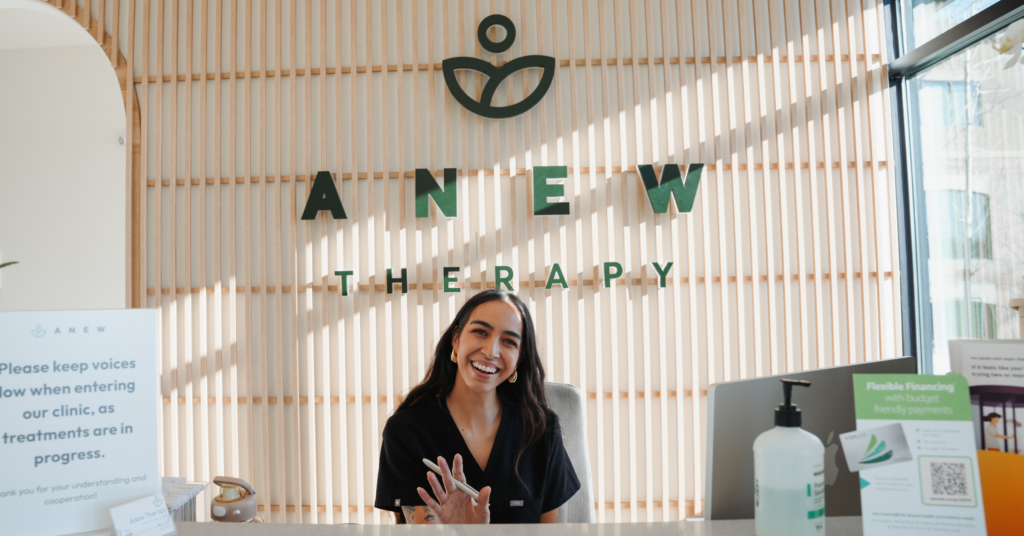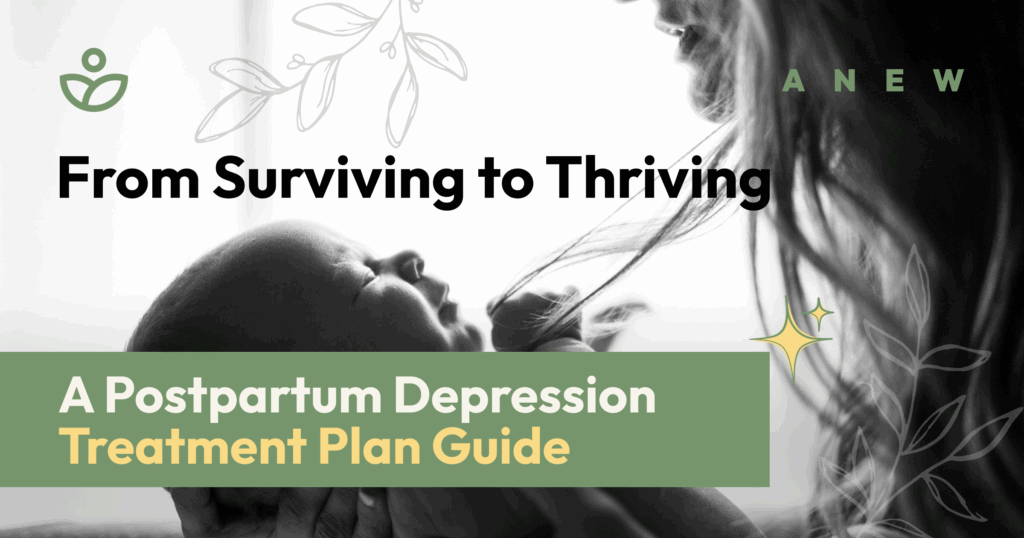A postpartum depression care plan is a roadmap that guides new mothers, their families, and healthcare providers through the detection, treatment, and recovery from postpartum depression. This structured approach combines screening, evidence-based treatments, family support, and ongoing monitoring for the best outcomes for both mother and baby.
The reality is stark: approximately 1 in 7 women develop postpartum depression, yet up to 50% of cases go undiagnosed. Unlike the “baby blues,” which resolve within two weeks, postpartum depression involves persistent sadness and anxiety that can last for months without proper treatment.
The transition after childbirth brings dramatic hormonal shifts, which, combined with sleep deprivation and the demands of a newborn, creates a perfect storm for depression. Early intervention is critical, as untreated PPD can impact infant bonding and child development. The good news is that with proper screening and support, most women make a full recovery.
As one clinical practice review notes: “Depression and its many sequelae affect multiple domains of perinatal health, and successful treatment increases the likelihood of optimal function in critical areas for mother and infant.”
Building Your Postpartum Depression Care Plan
If you’re feeling overwhelmed or sad after childbirth, you are not alone. Building a personalized postpartum depression care plan is a proactive step toward healing. This is a real medical condition, not a personal failing, and it is treatable.
Understanding Symptoms & Risk Factors
Postpartum depression (PPD) is linked to the dramatic hormonal crash after delivery, but other factors increase your risk:
- A personal or family history of depression or anxiety
- A limited support system
- A traumatic birth experience
- Severe sleep deprivation
- Thyroid issues, which can mimic PPD symptoms
- Other stressful life events, like financial or relationship conflicts
It’s crucial to distinguish PPD from the common “baby blues.” While baby blues are short-lived and mild, affecting most new parents within days of birth, postpartum depression is longer-lasting, more severe, and significantly impacts daily functioning and emotional well-being.
Screening & Diagnosis Toolkit
Early detection is key. Discuss your emotional well-being with your healthcare provider at your postpartum visits. They use validated screening tools to understand your symptoms:
- Edinburgh Postnatal Depression Scale (EPDS): A 10-question survey for postpartum women.
- PHQ-9 (Patient Health Questionnaire-9): Assesses the severity of depression symptoms.
These tools, along with a conversation about your feelings and sometimes blood tests to rule out physical causes like thyroid issues, help your provider make an accurate diagnosis.
Personalized Postpartum Depression Care Plan Goals & Outcomes
Your postpartum depression care plan should be personalized with SMART (Specific, Measurable, Achievable, Relevant, Time-bound) goals. The primary objectives are to improve your mood and energy, strengthen the bond with your baby, and restore your ability to manage daily life. Positive outcomes include better sleep, consistent nutrition, regular exercise, and active social engagement.
Evidence-Based Interventions for Your Postpartum Depression Care Plan
A comprehensive plan often combines several evidence-based interventions.
Psychotherapy (Talk Therapy): This is a cornerstone of treatment, providing a safe space to process your experiences and develop coping strategies.
- Cognitive Behavioral Therapy (CBT): Helps you identify and challenge negative thought patterns, such as “I’m a bad mother,” and replace them with more balanced, realistic thoughts.
- Interpersonal Therapy (IPT): Focuses on improving communication and navigating the significant role changes and relationship shifts that come with new parenthood.
- Support Groups: Connecting with other new mothers in a professionally-facilitated or peer-led group reduces isolation and provides validation for your feelings.
Medication & Advanced Therapies for Postpartum Depression
For moderate to severe cases of postpartum depression, medical intervention is often a crucial part of recovery. Treatment options range from traditional antidepressants to newer, fast-acting therapies—each with their own benefits depending on symptom severity, personal preferences, and how quickly relief is needed.
The most common types of traditional medication used for PPD are the following:
- Antidepressants (SSRIs): Selective serotonin reuptake inhibitors are commonly prescribed and many are considered safe while breastfeeding. A risk-benefit discussion with your healthcare provider is important to ensure the best choice for you and your baby.
- Brexanolone (Zulresso): The first FDA-approved treatment specifically for postpartum depression. It’s administered as a 60-hour IV infusion in a certified healthcare setting and can provide rapid symptom relief.
- Zuranolone: An oral medication recently approved for PPD that offers the convenience of at-home treatment and fast-acting results in some women.
In recent years, newer interventions like ketamine therapy, Spravato (esketamine nasal spray), and Transcranial Magnetic Stimulation (TMS) have gained recognition for their effectiveness in treating major depression, including postpartum depression, particularly when it’s severe or treatment-resistant.
- Ketamine & Spravato (Esketamine): These fast-acting therapies target the brain’s glutamate system, often relieving symptoms within hours or days. Spravato is FDA-approved for treatment-resistant depression and is administered under supervision in a clinic setting. Ketamine may be offered as an intramuscular injection and is increasingly used in the treatment plan for PPD.
- TMS (Transcranial Magnetic Stimulation): A non-invasive, drug-free option that stimulates areas of the brain involved in mood regulation. TMS is particularly appealing to those who want to avoid medication side effects or prefer not to modify their breastfeeding routine.
Clinics specializing in advanced mental health treatments, like Anew Therapy in Utah, offer these leading-edge therapies in a supportive, medically supervised environment. If you’re not finding relief through conventional approaches, these options may offer a path to faster, more effective healing. Learn more about ketamine therapy and TMS for PPD
Lifestyle and Holistic Strategies
Alongside professional treatment, lifestyle adjustments can significantly support recovery.
- Prioritize Sleep: While challenging with a newborn, sleep is crucial for mental health. Enlist your partner or family for night feedings to allow for a 4-5 hour stretch of uninterrupted sleep. Even short naps during the day can make a difference.
- Nourish Your Body: Focus on a balanced diet rich in omega-3 fatty acids (found in salmon and walnuts), B vitamins, and iron, as deficiencies can worsen depressive symptoms. Stay hydrated and limit caffeine and processed foods.
- Gentle Movement: Incorporate light physical activity into your day, such as a walk with the baby. Exercise releases endorphins, which can improve mood. Aim for 15-30 minutes most days of the week.
- Seek Sunlight: Exposure to natural light can boost serotonin levels. Try to spend at least 15 minutes outside each day.
Safety Planning: Your safety is the top priority. If you have thoughts of harming yourself or your baby, this is a medical emergency. Immediately contact 911 or the National Suicide Prevention Lifeline at 988.
Coordinating Support
An effective postpartum depression care plan extends beyond individual treatment to include a network of support.
Integrating Family, Community, and Professional Support
Healing from PPD is a team effort. Partner education is vital, as it helps your partner understand that PPD is a medical illness, not a choice or a sign of weakness. A supportive partner can provide practical help (taking over night feeds, managing household chores), emotional validation (listening without judgment), and logistical support (attending appointments, helping with medication reminders).

Beyond family, professional and community resources like nurse follow-up calls, support groups (Postpartum Support International is a great resource), and home-visiting programs can make a significant difference by creating a safety net of care.
Anew Therapy in Utah: Leading the Way in PPD Care
Postpartum depression is not a sign of weakness—it’s a medical condition that deserves swift, expert care. For Utah mothers, Anew Therapy is a premiere center offering advanced treatments that go beyond traditional approaches. With specialized, medication-free PPD care such as ketamine therapy, Spravato nasal spray, and TMS, Anew Therapy is transforming how postpartum depression is treated—and how quickly mothers can reclaim their wellbeing.
At Anew Therapy, you’ll receive:
- Comprehensive Evaluations: Using clinical tools like the Edinburgh Postnatal Depression Scale (EPDS), plus personalized intake that respects your lifestyle, breastfeeding goals, and emotional needs.
- Rapid Relief Treatments: Ketamine injections, Spravato sessions, or TMS are offered in a safe, supportive setting under experienced medical supervision.
- Whole-Person Healing: Integrated therapy, nutritional coaching, and stress management support to create lasting transformation.
- Ongoing Support: Continued monitoring and relapse prevention strategies ensure your recovery is strong and sustainable.
- Flexible, Accessible Care: With most major insurance accepted, and scheduling that works around a newborn’s needs, treatment is never out of reach.
Let Anew Therapy Utah be your guide to recovery. Schedule your free consultation today and take your first step toward reclaiming joy, balance, and connection during the postpartum journey.

Are you a Utah mother struggling with postpartum depression? Anew Therapy offers expert care and safe, proven results. Schedule your free evaluation today.

